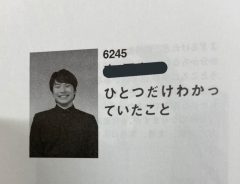
Source: © Pakutaso
Japanese high school girl who broke no-dating rule sues school for de-facto expulsion and wins
- Tags:
- expulsion / high school girl / Japanese high school / lawsuit / no-dating rule / school rules
Related Article
-

Manga “Noh Masked High School Girl Hanako” Puts An Odd Spin on The School Comedy Genre
-

Shedding Light On Japan’s “Shady School Rules”: Japanese Twitter Users Speak Out
-

Nissan launches $90 million dollar lawsuit against Carlos Ghosn
-

Student Called Out For Going Against School Policy: White Masks Only
-

Go-kart company ordered to rebrand and to pay 50 million yen in damages to Nintendo
-

Japanese high school student’s graduation yearbook page is pure genius


Japanese school rules and the law
The fact that high schools have rules governing their students' behavior is nothing surprising. However, some Japanese schools have come under public scrutiny in recent years for rules which are considered either outdated, too strict, or inappropriate.
For example, in 2017, a high school girl in Osaka sued her school for emotional damages for forcing her to dye her naturally brown hair black. She won in excess of $3,100 USD (according to exchange rates at the time) but only because the judge took issue with the fact that the school removed the student's name from the roster when she stopped coming to school after it told her she no longer needed to attend if she refused to dye her hair.
The rule itself was not considered problematic.
Other lawsuits focusing exclusively on the legality of a school rule have been dismissed outright. For example, according to The Mainichi, in 1985, plaintiffs lost a lawsuit claiming that a Kumamoto Prefecture junior high school's rule that all male students had to shave their heads was unjust and in 2011, a female student in Nara Prefecture lost a lawsuit claiming that her school's hair-dyeing rule amounted to corporal punishment.
However, as the Osaka school ruling shows, when schools pressure students to quit, there can be legal repercussions.
A de facto expulsion for dating
Such was the case in a ruling handed out today, November 30th, 2022, in a lawsuit filed by a former female student of 堀越高校 Horikoshi High School in Nakano, Tokyo, against the school's administrator, 堀越学園 Horikoshi Gakuen.
The school rule at issue wasn't related to students' appearance but to their behavior. More specifically, according to Livedoor News, Horikoshi High School prohibits 男女交際 "male-female dating."
The former student, who was given a recommendation of "voluntary withdrawal" from the school after having been subjected to a four-hour-long interrogation by a teacher in which she revealed that she was dating someone, sought damages amounting to approximately 7 million JPY (about $50,500 USD at today's rate). The Tokyo District Court ordered Horikoshi High School to pay her approximately 970,000 JPY (about $7,000 USD at today's rate).
In its ruling, the Tokyo District Court upheld the school rule prohibiting "male-female dating," calling it an "effective means of disciplining students," but pointed out that "the fact that the school recommended voluntary withdrawal without providing the student with any educational guidance is extremely inappropriate in terms of socially accepted ideas."
This is the first court decision ever in Japan ordering compensation in a lawsuit involving expulsion related to a school rule prohibiting male-female dating.
Although a recommendation for "voluntary withdrawal" in a Japanese school is technically not tantamount to outright expulsion, the complete lack of any guidance, in this case, surely made it very clear to her that she was no longer welcome and, even assuming she could have somehow remained in the school, it would have been exceedingly difficult. Therefore, for all intents and purposes, it was a de facto expulsion.
Online, the ruling elicited numerous reactions, both for and against the school's no-dating rule, such as: